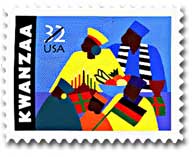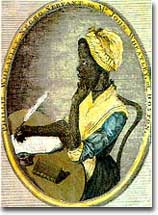6g. A New African-American Culture

Kwanzaa is an African American and Pan-African holiday which celebrates the best of African history, thought, and culture.
When immigrants reach a new land, their old ways die hard. This has been the case with most immigrant groups to the New World. The language, customs, values, religious beliefs, and artistic forms they bring across the Atlantic are reshaped by the new realities of America and, in turn, add to its fabric. The rich traditions of Africa combined with the British colonial experience created a new ethnicity — the African American.
Much controversy arises when attempts are made to determine what African traditions have survived in the New World. Hundreds of words, such as "banjo" and "okra" are part of American discourse. Africans exercised their tastes over cuisine whenever possible. Song and dance traditions comparable to African custom were commonly seen in the American South. Folk arts such as basket weaving followed the African model. Even marriage patterns tended to mirror those established overseas.

Phillis Wheatly's poetry reflected the slavery experience on the cusp of the American Revolution.
Much of African history is known through oral tradition. Folk tales passed down through the generations on the African continent were similarly dispatched in African American communities. Some did learn the written word. Poet and slave Phillis Wheatley is still studied. Her writings vividly depict the slave experience on the eve of the American Revolution.
Many devout British colonists saw conversion of slaves to Christianity as a divine duty. Consequently, the Christian religion was widely adopted by slaves. The practice of Christianity by slaves differed from white Christians. Musical traditions drew from rhythmic African and melodic European models. The religious beliefs of many African tribes merged with elements of Christianity to form voodoo. Spirituals also demonstrate this merger.
Despite laws regulating slave literacy, African Americans learned many elements of the English language out of sheer necessity. Since the planters' children were often raised by slaves, their dialects, values and customs were often transmitted back. This reflexive relationship is typical of cultural fusion throughout American history.






